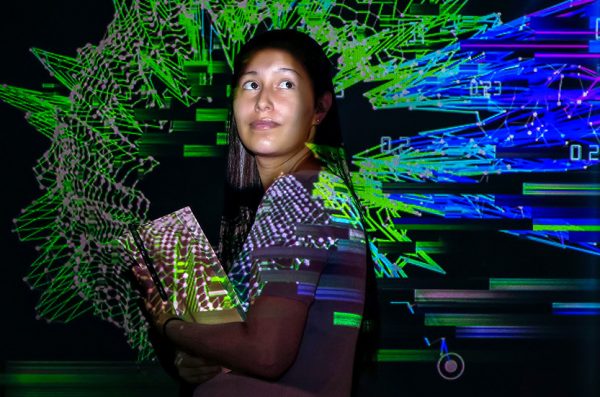Data Science Major
major

Data science — the ability to organize, process, and derive insight from enormous amounts of information — draws from a variety of skill sets. Data scientists are trained in computing. They’re also experts in statistics. They understand how their work influences the business world, from corporations to government agencies. And they have the ability to take the complex work they do and explain it to all audiences, making them excellent communicators.
To make sure each UIC data science major is prepared to excel at all of these tasks, we tapped into the expertise of three UIC colleges for the program’s core courses: the College of Engineering (home to the computer science department), the College of Liberal Arts and Sciences (which houses math, statistics, and communication), and the College of Business. Two more colleges, the College of Applied Health Sciences and the College of Urban Planning and Public Affairs, contribute to our specialized data-science concentrations.
Together, we will teach you how to do highly important work that is often highly compensated: developing methods to comb through huge repositories of data, unearthing the nuggets of meaningful information that can help businesses, governments, and nonprofit organizations to chart the best course.
One of the great advantages of data science is that you can apply its skills to any field or industry that interests you. Data science approaches are relevant in health care, computing, information technology, urban planning, retail, marketing, manufacturing, transportation, communication, education, insurance, finance, science, security, law enforcement, and more. Data science at UIC is a multidisciplinary major that builds a strong foundation and gives you the option to specialize in a field of your choice (see our nine concentrations below).
The data science major is outlined in detail in the UIC course catalog. The content below provides an overview.

Wondering about data science?
Data science isn’t a subject most students take in high school, so you might be curious what it’s all about. This one-page PDF overview will help.
Data science major requirements
Data science majors complete coursework in three major categories:
General education courses
General education courses are designed to make you a well-rounded, well-informed graduate across disciplines outside of data science. These requirements total 37 credit hours:
- ENGL 160 Academic Writing I: Writing in Academic and Public Contexts (3 credits)
- ENGL 161 Academic Writing II: Writing for Inquiry and Research (3 credits)
- Foreign language (8 credits)
- Understanding the Individual and Society course (3 credits)
- Understanding U.S. Society course (3 credits)
- Exploring World Cultures course (3 credits)
- Understanding the Creative Arts course (3 credits)
- Understanding the Past course (3 credits)
- Analyzing the Natural World courses: two classes that include labs (8 credits total)
Core courses
Data science majors complete the following core courses to develop their foundation in the set of fields that underpin this interdisciplinary major. These core requirements add to 57 credits toward the degree.
- ENGR 100 Engineering Orientation (no credit)
- MATH 180 Calculus I (4 credits)
- MATH 181 Calculus II (4 credits)
- MATH 210 Calculus III (3 credits)
- MATH 310 Applied Linear Algebra (3 credits)
- CS 111 Program Design I (3 credits)
- CS 141 Program Design II (4 credits)
- CS 151 Mathematical Foundations of Computing (3 credits) or MCS 361 Discrete Mathematics (3 credits)
- CS 211 Programming Practicum (2 credits)
- CS 251 Data Structures (4 credits)
- CS 377 Communications and Ethical Issues in Computing (3 credits)
- STAT 382 Statistical Methods and Computing or IDS 462 Statistical Software for Business Applications (3 credits)
- STAT 385 Elementary Statistical Techniques for Machine Learning and Big Data (3 credits)
- STAT 481 Applied Statistical Methods II (3 credits)
- IDS 312 Business Project Management (3 credits)
- IDS 435 Optimization Models and Methods (3 credits)
- CS 418 Introduction to Data Science or IDS 472 Business Data Mining (3 credits)
- CS 480 Database Systems or IDS 410 Business Database Technology (3 credits)
Plus one course chosen from the three below:
- STAT 381 Applied Statistical Methods I (3 credits)
- IE 342 Probability and Statistics for Engineers (3 credits)
- ECE 341 Probability and Random Processes for Engineers (3 credits)
Concentration courses
All data science majors must choose and complete one of nine concentrations. See the “Concentrations” section on this page for more information on the courses for each one.
Watch our town hall video
Our Computer Science and Engineering faculty shows you what Data Science is all about.
Data science concentrations
Bioinformatics
Total credits: 15-16
Prerequisites (required):
- BIOS 110 Biology of Cells and Organisms* (4 credits)
- BIOS 120 Biology of Populations and Communities* (4 credits)
*Also counts toward the lab science general requirement.
Required:
- BIOS 220 Genetics (3 credits)
- BIOS 430 Evolution (4 credits)
- BME 480 Introduction to Bioinformatics (3 credits)
- BME 481 Bioinformatics Laboratory (2 credits)
Plus one of these courses:
- BME 240 Modeling Physiological Data and Systems (3 credits)
- BME 339 Biostatistics I (3 credits)
- BME 407 Pattern Recognition I (3 credits)
- BME 439 Biostatistics II (4 credits)
Business analytics
Total credits: 18
Required: four courses (12 credits) from the following:
- IDS 400 Programming for Data Science (3 credits)
- IDS 422 Text Mining for Business (3 credits)
- IDS 460* Causal Inference and Experimental Design (3 credits)
- IDS 476 Business Forecasting using Time Series (3 credits)
- IDS 420 Business Models and Simulation (3 credits)
- IDS 473 Risk Management (3 credits)
Business foundation: two courses (6 credits) from:
- ACTG 210 Introduction to Financial Accounting (3 credits)
- FIN 300 Introduction to Finance (3 credits)
- MKTG 360 Introduction to Marketing (3 credits)
- IDS 355 Operations Management (3 credits)
- MGMT 340 Introduction to Organizations (3 credits)
Electives chosen from the following:
- ACTG 210 Introduction to Financial Accounting (3 credits)
- ACTG 211 Introduction to Managerial Accounting (3 credits)
- FIN 300 Introduction to Finance (3 credits)
- FIN 310 Investments (3 credits)
- FIN 416 Options and Futures Markets (3 credits)
- FIN 480 Market Microstructure and Electronic Trading (3 credits)
- IDS 454 Supply Chain Management (3 credits)
- IDS 450 Supply Chain Planning and Logistics (3 credits)
- IDS 479 Enterprise Risk Management (3 credits)
- MGMT 340 Introduction to Organizations (3 credits)
- MKTG 360 Introduction to Marketing (3 credits)
- MKTG 460 Marketing Analytics (3 credits)
- MKTG 462 Marketing Research (3 credits)
- MKTG 479 Digital and Social Media Marketing (3 credits)
*IDS 460 will be a choice before and after a title change. Its current title is Survey Sampling: Theory and Methods.
Computer science
Total credits: 15
Note: CS 418 Intro to Data Science and CS 480 Database Systems must be chosen in the “core requirements” section in order to pursue this concentration.
Five courses chosen from the following, of which at least four must come from CS:
- CS 342 Software Design (3 credits)
- CS/MCS 401 Computer Algorithms I (3 credits)
- CS 411 Artificial Intelligence I (3 credits)
- CS 412 Introduction to Machine Learning (3 credits)
- CS 421* Natural Language Processing (3 credits)
- CS 424 Visualization and Visual Analytics (3 credits)
- STAT 461 Applied Probability Models I (3 credits)
- STAT 471 Linear and Non-Linear Programming (3 credits)
- STAT 473 Game Theory (3 credits)
- MCS 471 Numerical Analysis (3 credits)
*CS 421 has CS 301 Languages and Automata as a prerequisite.
Data Processing, science, and engineering
Total credits: 15-17
Note: ECE 341 must be chosen as the selective probability and statistics choice in the common core in order to pursue this concentration.
Required courses (6 credits)
- MATH 220 Introduction to Differential Equations (3 credits)
- ECE 310 Signals and Systems (3 credits)
Electives (select 3 courses):
- ECE 317 Digital Signal Processing I (4 credits)
- ECE 407 Pattern Recognition (3 credits)
- ECE 417 Digital Signal Processing II (4 credits)
- ECE 418 Statistical Digital Signal Processing (3 credits)
- ECE 415 Image Analysis and Computer Vision I (3 credits)
- ECE 434 Multimedia Systems (3 credits)
- ECE 452 Robotics: Algorithms and Control (3 credits)
Health data science
Total credits: 17
Note: All courses will be 8 weeks and delivered in an online format.
Required:
- BHIS 406 Medical Terminology for Health Information Management (2 credits)
- HIM 410 Introduction to the US Healthcare System (3 credits)
- BHIS 460 Introduction to Health Informatics (1 credit)
- HIM 317 Principles of Health Information Management (4 credits)
- BHIS 428 Consumer Health: Engaging Patients Through Technology (3 credits)
- HIM 337 Analysis of Healthcare Data (4 credits)
Industrial engineering
Total credits: 13
Note: IE 342 must be chosen as the selective probability and statistics choice in the “core requirements” section in order to pursue this concentration.
Required:
- IE 345 Regression Application and Forecasting in Engineering (3 credits)
- IE 365 Work Productivity Analysis (4 credits)
- IE 446 Quality Control and Reliability (3 credits)
- IE 471 Operations Research I (3 credits)
Optional electives, if students wish to take more than the 13 hours of required courses:
- IE 442 Design and Analysis of Experiments in Engineering (3 credits)
- IE 461 Safety Engineering (3 credits)
- IE 463 Plant Layout and Materials Handling (3 credits)
- IE 466 Production Planning and Inventory Control (3 credits)
- IE 467 Discrete Event Computer Simulation Application (3 credits)
- IE 472 Operations Research II (3 credits)
- IE 473 Stochastic Processes and Queuing Models (3 credits)
Social technology studies
Total credits: 18
Required courses: any three from the selection below (9 credits)
- COMM 206 Public Relations and Digital Media (3 credits)
- COMM 216 Digital Journalism (3 credits)
- COMM 220 Social Media and Marketing (3 credits)
- COMM 240 Data Journalism (3 credits)
- COMM 250 Social Media and Society (3 credits)
Selective courses: any three courses from selection below, at least two of which are at the 400-level (9 credits)
- COMM 205 Health and the Media (3 credits)
- COMM 206 Public Relations and Digital Media (3 credits)
- COMM 220 Social Media and Marketing (3 credits)
- COMM 260 Games as Social Technology (3 credits)
- COMM 425* Digital Advocacy (3 credits)
- COMM 430 Media, Information and Society (3 credits)
- COMM 433 Mobile Media and the City (3 credits)
- COMM 435 Data, Privacy and Ethics in the Digital Age (3 credits)
- COMM 489 Human Augmentics (3 credits)
*COMM 425 has a prerequisite of COMM 301. In addition, data science majors must obtain department approval.
Statistics
Total credits: 15
Required courses (15 credits):
- STAT 401 Introduction to Probability (3 credits)
- STAT 411 Statistical Theory (3 credits)
- STAT 451 Computational Statistics (3 credits)
- STAT 485 Intermediate Statistical Techniques for Machine Learning and Big Data (3 credits)
- STAT 486. Statistical Consulting (3 credits)
Optional electives, if students wish to take more than the 15 hours of required courses:
- CS 411 Artificial Intelligence I (3 credits)
- CS 424 Visualization and Visual Analytics (3 credits)
- STAT 431 Introduction to Survey Sampling (3 credits)
- STAT 475 Mathematics and Statistics for Actuarial Sciences I (3 credits)
Urban policy analytics
Total credits: 18-19
Understanding Public Problems: Choose two from the list below (6 credits)
- PPOL 100 Individual Action and Democracy (3 credits)
- PPOL 210 Introduction to Public Policy (3 credits)
- PPOL 220 Social Justice and the City (3 credits)
- PPOL 230 Nonprofits and US Society (3 credits)
- UPP 403 Planning Practices for Great Cities (3 credits)
- US 101 Introduction to Urban Studies (3 credits)
- US 202 Social Justice and the City (3 credits)
- US 301* Political Economy of Urban Development (3 credits)
Urban Data Visualization and Geospatial Analysis: Choose two from the list below (6-7 credits)
- PA 435 Geographic Information Systems (GIS) for Public Managers (4 credits)
- UPP 461 Geographic Information Systems for Planning and Policy (3 credits)
- UPP 462 Intermediate GIS for Planning and Policy (3 credits)
- US 361* Introduction to Geographic Information Systems I (3 credits)
Policy Analysis: Choose two from the list below (6 credits)
- PPOL 307 Policy Analysis III: Identifying and Developing Alternatives
- PPOL 405 Evaluating Public Policies and Programs
- UPP 465 Topics in Geospatial Analysis and Visualization (Spatial Statistics section)
- US 250 Analyzing the City
- US 306* Urban Policy Analysis Methods
*This course has a prerequisite that can be taken as a free elective in order to register for this course.
Meet some data science students!
Advice from our faculty

Why consider the data science major? Do you want to help your community, improve healthcare, or design the next generation of AI-powered systems? UIC’s data science curriculum will equip you with the statistical and computational background necessary to tackle the most pressing problems of our times. The best part is that the problems you choose to work on can be as diverse as your background and interests.
| Assistant Professor, Computer Science

Data science is code speak for the future. It is a way for understanding how technologies reproduce and reinforce social injustices and, at the same time, re-deploying technologies to help reimagine our world. Data organize our world in categories that underscore how we connect as human beings but also how we may drift apart, fostering cultures of marginalization, misinformation, and algorithmic bias.
If you want to unlock technology and use it to make the world better, this is the degree for you.
| Professor and Department Head, Communication; Professor, Political Science

In the past decade, advances in the way data can be generated, collected, stored, and disseminated have resulted in an exponential growth of data. This has led to an increasing demand for skilled professionals in the field of data science who can analyze and extract insights from this data. UIC’s new data science major will provide students with a solid foundation in computer science, information and decision sciences, and statistics, and will position them to succeed in this rapidly-growing field.
| Clinical Assistant Professor, Computer Science

The demand for data analytics and artificial intelligence applications in healthcare is growing rapidly. Predictive analytics provides decision support to caregivers to improve the accuracy of diagnoses for individual patients, as well as defining patterns in populations. Understanding how to predict those at risk for certain disease conditions and recommend lifestyle changes to improve overall wellness is important to us all. Artificial intelligence can assist clinicians with complex data interpretation of digital images and improve quality of life for patients with severe brain injuries. UIC’s health data science concentration will show you how data is used in healthcare.
| Clinical Associate Professor and Director, Health Information Management
Student learning objectives: Data science major
If you choose to major in data science at UIC, what can you expect by the time you have finished the program? Our faculty compiled the list below to give you a sense of the competencies we expect students to possess when they have completed all the requirements.
By the time they graduate, data science students will:
- Be able to analyze a complex data analysis problem and to apply principles of computing, statistics, and mathematics to identify solutions
- Be able to design, implement, and evaluate a computing-based solution to meet a given set of requirements in the context of data science
- Be able to function effectively on teams to accomplish a common goal
- Be able to carry out statistical analysis of data
- Be able to execute statistical analyses with professional statistical software
- Be able to explain how data science projects contribute to the strategic goals of organizations
- Either have domain knowledge and be able to apply it in an area of application of data science, or have advanced knowledge of at least one of software development, computing theory, or statistical theory, and be able to apply it to solve data science problems


